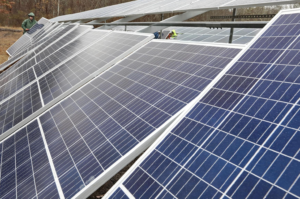Letter: Massachusetts needs to regain its solar edge
By Jennifer DeLaney on October 9, 2020
“Legislation now in committee could help open up the project pipeline, create jobs, and rein in climate pollution.”
The Standard-Times verifies and reviews all letters to the editor we receive. The letters represent the views of the letter writers, not those of The Standard-Times.
Not long ago, the idea of fully powering the Massachusetts economy with renewable energy was dismissed as a pipedream. The topic of a 100 percent renewable economy raises far fewer eyebrows today, however, thanks to success demonstrated by a new clean energy industry supported by a suite of state incentives and policies enacted over a decade ago. Sceptics persist, though, and the word “bridge” often creeps into conversations about transitioning to renewable power.
Natural gas has served as a necessary bridge between our reliance on dirtier fossil fuels and a future powered by renewable energy. But if gas was a bridge, it’s been crossed – into the land of renewables long ago. Scientists around the world agree there is only a decade left for actions that would stop irreversible climate change. As United Nations General Assembly President María Fernanda Espinosa Garcés warned her colleagues last year, “We are the last generation that can prevent irreparable damage to our planet.”
For years, I worked in the natural gas industry – comfortable in the knowledge that its carbon footprint pales in comparison to other fossil fuels. My epiphany happened while bicycling across the U.S. in between jobs, and witnessing the diverse array of ecosystems, natural resources, and communities at stake if we don’t avert the gathering climate catastrophe.
Eager to do my part, I returned home and joined what was a promising Massachusetts solar industry in 2016, directing construction of hundreds of megawatts of clean solar power. But, as quickly as solar took hold in Massachusetts, the industry now losing ground. I worry that we lack strong clean energy policy from our current leadership, and so companies in the Commonwealth are shedding jobs, scuttling projects, and losing momentum even as neighboring states like New York and Maine strengthen their commitment to solar.
Read more via SouthCoast Today >>
